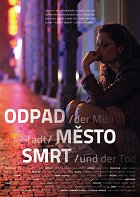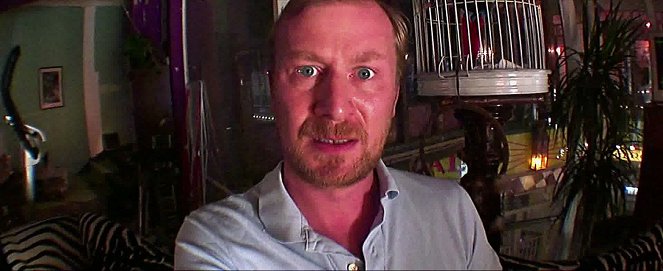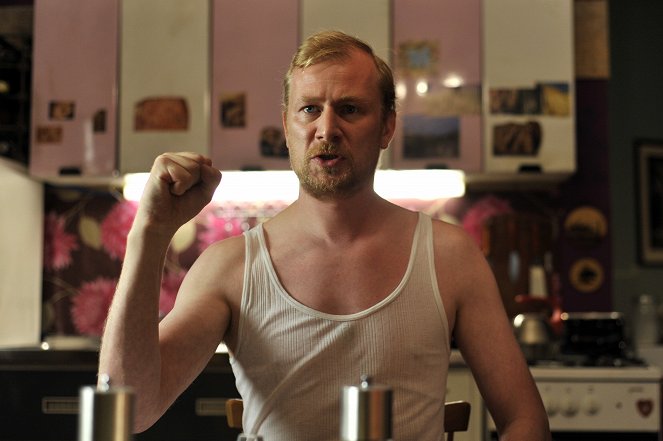Réalisation:
Jan HřebejkMusique:
Ivan AcherActeurs·trices:
Gabriela Míčová, Jiří Černý, Martin Finger, Stanislav Majer, Martin Pechlát, Dana Poláková, Anna Polcarová, Štefan Chovanec, Tereza BebarováRésumés(1)
The screenplay (Der Müll, die Stadt und der Tod) by Rainer Werner Fassbinder inspired a theatre production by Dušan Pařízek. The screenplay and the production in turn inspired the film ODPAD MĚSTO SMRT (Waste, City, and Death) by Jan Hřebejk. Romi, a prostitute, is anything but successful at her job: she is of far too gentle a nature for her clients. The more obstinately she is pushed to the streets by her pimp Franz, the closer she is to a complete breakdown. One day Romi is addressed by a property speculator referring to himself as a "wealthy Jew." He does not demand any sexual services of her. He satisfies himself with Romi telling him stories, for which he lavishly rewards her. However, no one shares the sudden happiness with Romi. Her work-mates and current clients turn their backs on her, as does Franz, with whom Romi is in love. The whole story takes place in the setting of a dilapidated city, during the clean-up of which politicians openly split their profit with speculators and lobbyists, all under protection from the police. (texte officiel du distributeur)
(plus)Vidéo (1)
Critiques (5)
Un vrai régal, sauf que je ne sais pas si je dois le qualifier de filmique ou de théâtral. Je n’avais pas vu l’œuvre modèle, ce qui est pour moi toujours un grand plus étant donné que les adaptations filmiques de pièces de théâtre me satisfont rarement et passent généralement sous mes Fourches caudines. Cependant, je considère l’effort de Hřebejk comme une sorte d’hommage, une expression d’admiration et de respect pour les créations de Dušan Pařízek et de sa troupe. Le premier atout de taille, c’est le brillant scénario et sa myriade de répliques percutantes et de réflexions belles et tristes. En deuxième lieu, il y a l'excellente prestation de l’équipe d’acteurs idéale, emmenée par Gabriela Míčová. La façon dont l’ambiance générale est dépeinte constitue un troisième plus ; j’avais l’impression d’être totalement plongé dans l’histoire, dans l’époque. Je suis enchanté ! Et je me joins aux plaintes répétées à l’encontre de la mairie de Prague pour avoir laissé disparaître une troupe aussi exceptionnelle. Le Théâtre de Dejvice a ainsi vu disparaître son seul concurrent valable.
()
I haven't seen this in the theater, but because I am well-read in Fassbinder, I understand that he wanted to settle things with the German bourgeoisie, the establishment that never fully separated itself from its war past during Fassbinder's short life, with all the conformists against whom the left-wing agitator defined himself. Thinking about it, he was bothered by everything and everyone. With knowledge of German history, everyone probably understands why a big Jew appeared in the play, and with awareness of Fassbinder's sexual orientation, you will understand why his characters have such complicated sexuality. However, this context is lost when the play is transferred to the Czech environment, and what remains is a clumsy attempt at great art. I also have a fundamental problem with Gabriela Míčová. Her prostitute Romi, at least as I understand her, was supposed to be in the midst of those selfish monsters, the only human being who allows herself to be exploited by others, and one should feel at least some sympathy for her. I don't know if it's her acting or if her personality has this effect on me, but she seems just as repulsive or unsympathetic to me as the rest of that strange gathering. Overall impression: 25%.
()
It's not a pretty film and it's not easy to watch, as it has more of a theatrical feel, which generally bothers me in movies. However, the performances are so good that I just watched their dialogues, which are not without substance, and the relationships are well captured, even if they seem somewhat exaggerated. Good movie.
()
Waste, city, boredom, death. The libretto is very nice, I like the actors. I miss the minimalism of the Comedy scene and the greater involvement of the Film's opulent scene. A few imaginative moments, a polished camera, mannerism. But mainly words, words, words - nice, vulgar, depressing, alienated. The film adds very little to them, Fassbinder swims in the lights and in the changing civility / stylization of certain voices. In the end, the strange theater wins over the intention to find an exciting film dimension in a play that was a film script. Simply a good production transplanted into stylized Prague exteriors / interiors, which are sometimes makeweight and rather fragment the attention intended for the actors and replicas. Nothing more.
()
I’m glad that Czech cinema is doing something other than the norm, but it still somehow needs to rape Fassbinder and Lucerna. So we get Wenceslas Square in a slightly different light and Lucerna in the most traditional light. It has its moments, Pechlát as a tranny singing is one of the funnier moments, but then it goes downhill. Stereotypes about Jewish machinations and their gay hustlers belong to a borrowed environment and Prague doesn't correspond to that as much as Berlin might, for example. I also have absolutely no problem with Gabriela Míčová's performance, because I still have a vivid memory of her fiasco in other works and this was not all that different.
()



Annonces